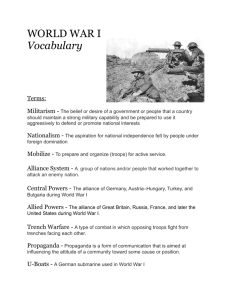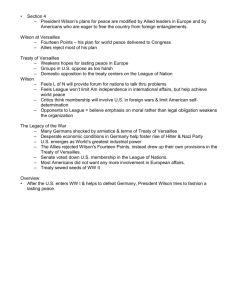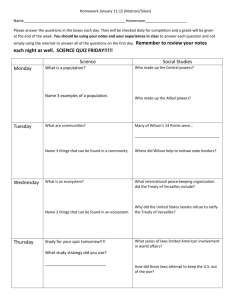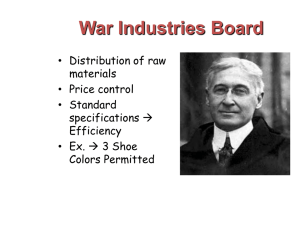Chapter 11, Section 4: Wilson Fights for Peace
advertisement
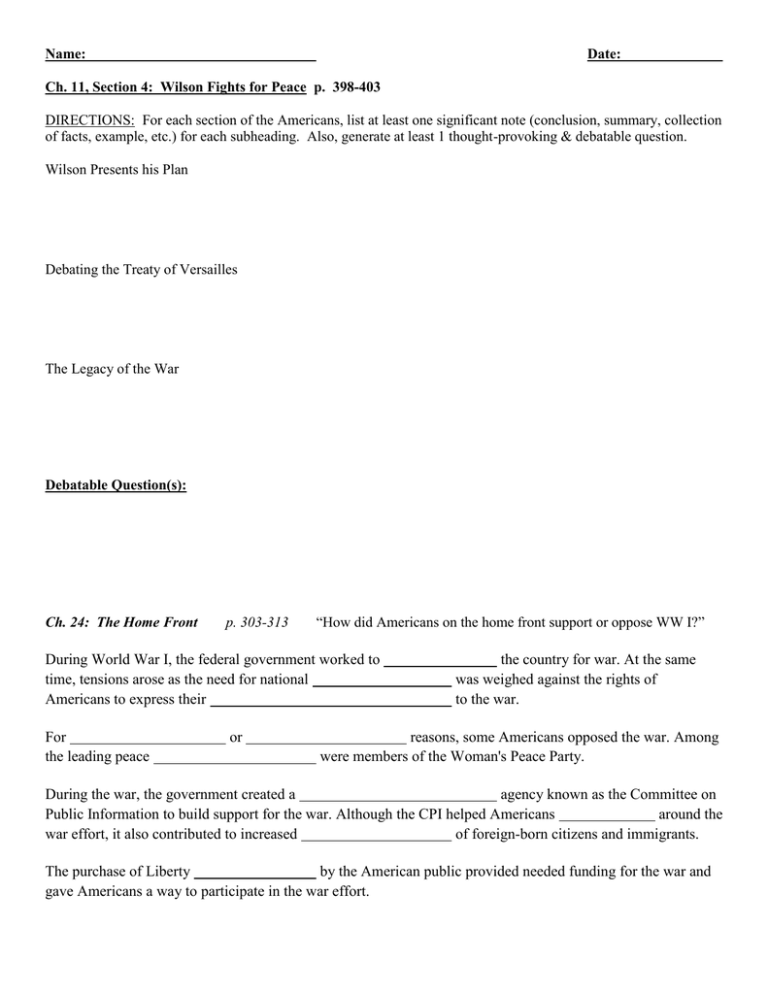
Name: Date: Ch. 11, Section 4: Wilson Fights for Peace p. 398-403 DIRECTIONS: For each section of the Americans, list at least one significant note (conclusion, summary, collection of facts, example, etc.) for each subheading. Also, generate at least 1 thought-provoking & debatable question. Wilson Presents his Plan Debating the Treaty of Versailles The Legacy of the War Debatable Question(s): Ch. 24: The Home Front p. 303-313 “How did Americans on the home front support or oppose WW I?” During World War I, the federal government worked to time, tensions arose as the need for national Americans to express their For the leading peace or the country for war. At the same was weighed against the rights of to the war. reasons, some Americans opposed the war. Among were members of the Woman's Peace Party. During the war, the government created a agency known as the Committee on Public Information to build support for the war. Although the CPI helped Americans around the war effort, it also contributed to increased of foreign-born citizens and immigrants. The purchase of Liberty by the American public provided needed funding for the war and gave Americans a way to participate in the war effort. Ch. 24: The Home Front p. 303-313 “How did Americans on the home front support or oppose WW I?” Ch. 24… CONTINUED During the war, hundreds of thousands of African Americans migrated out of the , in an event known as the . They were attracted to northern cities by opportunities and hopes for a better life. The Espionage and Sedition acts allowed the federal government to suppress The laws made it to express opposition to the war. sentiment. S and W who opposed the war became the targets of both patriot groups and the government for their antiwar positions. Many were under the Espionage and Sedition acts. Schenck v. United States The Supreme Court upheld the of the Espionage Act in this 19 case. It ruled that the government could restrict freedom of speech in times of " and danger." Ch. 25: The Treaty of Versailles: Ratify or Reject? p. 315-323 “Should the US have ratified or rejected the Treaty of Versailles?" After World War I, President Woodrow Wilson hoped to create a peace. He insisted that the treaty ending the war should include a peacekeeping organization called the of Many Americans feared that membership in the League could involve the United States in future Wilson outlined his goals for lasting peace in his , freedom of the groups, and collective organization. , . . Points. Key issues included an end to secret of armaments, self-determination for through creation of an international peacekeeping When the heads of the four major Allies—France, Great Britain, Italy, and the United States—met in for peace talks, they were more focused on than on Wilson's plan. The treaty negotiated in Paris redrew the of Europe, granting self-determination to some groups. Some Allies sought on Germany, insisting on a clause and reparations from Germany. Wilson hoped that including the League of Nations in the final would make up for his compromises on other issues. He believed that by providing collective security and a framework for peaceful talks, the League would many problems the treaty had created. The treaty ratification debate divided the U.S. into three groups. would not accept the treaty unless certain changes were made. Irreconcilables in any form. supported the treaty and the League. the treaty politics and Wilson's to compromise led to the treaty's rejection and ended Wilson's hopes for U.S. membership in the League of Nations.


